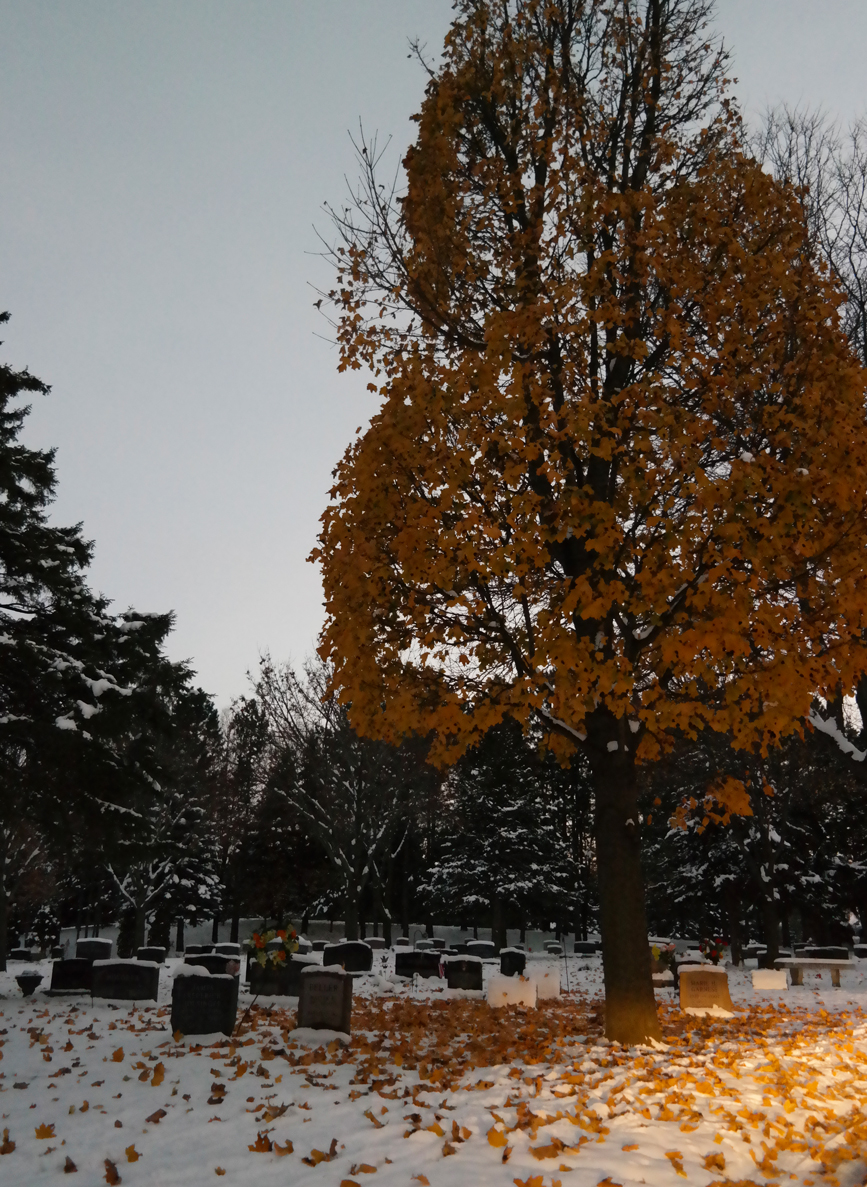
Almost thirty years ago, Jonas Salk, the American virologist who developed the first successful polio vaccine, asked a simple question in one of his final published articles: “Are we being good ancestors?”
I came across that haunting question as I was archiving some old research. Unfortunately, my first reaction was no. What is perhaps worse is that, not that long ago, my answer would have been yes – not just a yes, but an emphatic yes.
Salk was not only the creator of the polio vaccine; he was also the instigator of “biophilosophy,” dubbed its “father” by the New York Times in 1966. He would describe a biophilosopher as “someone who draws upon the scriptures of nature, recognizing that we are the product of the process of evolution, and understands that we have become the process itself, through the emergence and evolution of our consciousness, our awareness, our capacity to imagine and anticipate the future, and to choose from among alternatives.”

A snow-covered graveyard [M. Tejeda-Moreno]
The human capacity to imagine a future, and ultimately to manifest it, was Salk’s fundamental point. We were still bound by natural forces like evolution, but we had become a force ourselves, and we could use that power to benefit the Earth, not just the human species. Salk insisted that we are part of a continuous process of creation where we reinterpret the customs, beliefs, and traditions of the past by focusing on “both/and” rather than “either/or.” He wondered whether we are forging a better quality of life for future generations, eliminating the shackles of pestilence and violence.
His writing raises the question of whether we are the beneficiaries of good works of the past. In my tradition, which relies upon the spiritual knowledge of the Yoruba people, ancestors are venerated. But that veneration does not assume transformation, only the loss of physicality. Whatever faults and graces they possessed, they carried with them into the afterlife: crazy uncle Roger is still crazy uncle Roger even after his death.
Ancestors are venerated not for their power over the living, but rather for the experience and knowledge they can share. The afterlife is not a hill in time with a better vantage to see the future. The ancestors give wise counsel because they have been through one lifetime and may have witnessed many others. Our lives and our times are not sitcom reruns, but they’ve watched enough episodes to know which ones need better writers.

An ancestor altar
We have a saying: “El diablo sabe más por viejo que por diablo,” which means “the devil knows about more things because he is old than because he is the devil.”
It is also easy to forget the hard times our ancestors suffered. My ancestors suffered devastating pandemics, famines, centuries of persecution, cultural genocide, and slavery. Many of my ancestors lacked agency. They suffered those hardships as victims, yet transformed those hardships into hope. I benefit from that decision, and I benefit from their experience.
Were they good ancestors? Yes – I’m here, reasonably healthy, and able to fight for the next generation.
These times, however, feel different. We have tools that were only dreams for our ancestors. Among them are the ability to send an instant message across oceans, to photograph atoms (let alone viruses), to sequence DNA in hours, and to live double, or even triple, the average lifespan that they would have had.
Our ability to understand our world is unparalleled in history. Yet, despite the incredible tools at our disposal, we struggle to deploy them. We struggle to be effective stewards of our planet, let alone be effective champions for each other.
It is for those reasons that I question whether we will be seen as good ancestors. It feels that, unlike any time in our past, we are able to imagine any future we choose and ultimately to manifest it as we desire, and yet it seems we have not done a good job at manifesting a future that seems bright at all.
My ancestors say, however, that they wondered the same thing, and they watched other ancestors wonder the same. They too lived at the pinnacle of technology. They too thought humanity was moving retrograde. Whatever my arguments are about these times being different, even unprecedented, I’ve heard their scoffs in divination, and I’ve read their doubts in stories and journals. They brought me back to Salk’s point of “both/and” rather than “either/or.”
“If we are to be good ancestors,” Salk wrote, “transmitting the possibility of a better life and the joy of living, we have work to do now. The first step is to open ourselves to the as yet unrealized possibilities that exist in humankind. Only in the future will it be known whether or not we have been wise ancestors. However, now is the time to accept the challenge.”
I will keep my doubts and hopes. I will also keep faith that the balance is always righting itself, and strive to keep Salk’s wisdom. I’m not sure, however, I can persuade myself to believe that our times are no different.
As Samhain approaches, I will try to recognize more clearly the choices I have to manifest those things I believe are important and strengthen the next generation. Then I will look ahead, toward building my own wisdom and experience, that I might someday offer meaningful guidance.
I hope we all will, because, someday, there will come a Samhain when it is our turn to offer counsel.
The Wild Hunt is not responsible for links to external content.
To join a conversation on this post:
Visit our The Wild Hunt subreddit! Point your favorite browser to https://www.reddit.com/r/The_Wild_Hunt_News/, then click “JOIN”. Make sure to click the bell, too, to be notified of new articles posted to our subreddit.